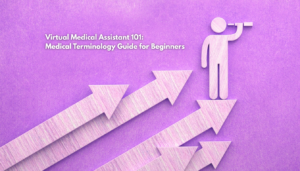AI in Healthcare: Transforming Patient Care and Medical Practices
03 Jun 2025 By: Vlade Legaspi
Updated
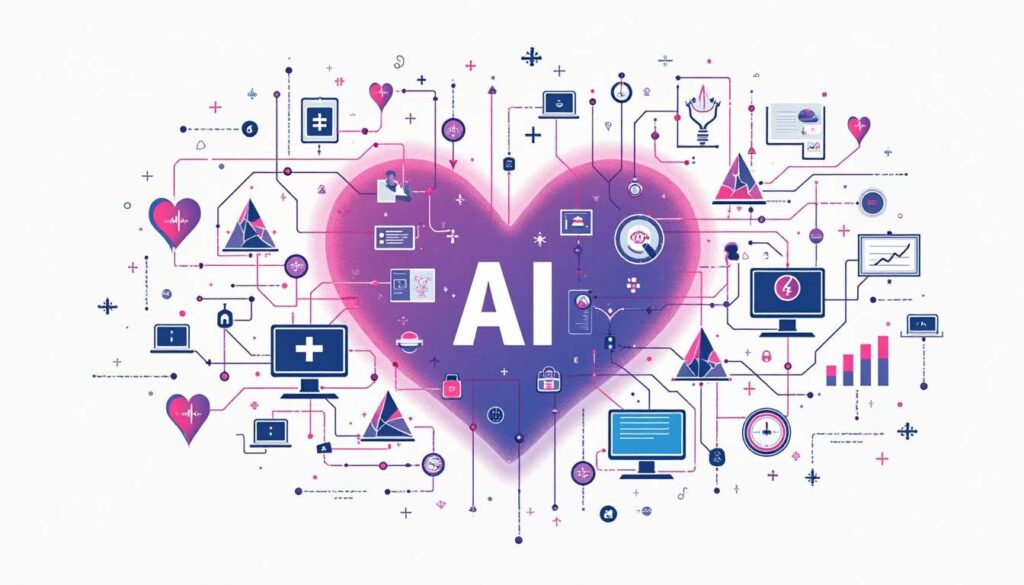
AI is used in healthcare to help clinicians diagnose conditions faster, personalize treatment, and reduce time spent on paperwork. It can analyze medical images, flag high-risk patients using predictive analytics, and summarize clinical notes with natural language processing. For example, an AI tool can scan a CT image to highlight a possible tumor for a radiologist to review, which can speed up decisions and improve accuracy.
The Role of AI in Diagnostics
AI’s top role in healthcare is boosting diagnosis. Human skills can falter from tiredness, bias, or too much data. AI sorts through loads of info fast and spot-on. In busy clinics, quick and sharp diagnoses can greatly improve patient care.
Improving Accuracy with Machine Learning
Machine learning learns from data and spots patterns fast. In radiology, AI finds issues in scans like tumors or breaks. It can match or beat human experts. This speeds up results and cuts errors. As AI trains with new data, it grows sharper and tracks new health trends. For specialists interested in leveraging these innovations in real clinical environments, exploring AAG Locum Tenens radiology jobs can open doors to positions where advanced imaging and AI-driven diagnostics are actively used.
Predictive Analytics for Early Detection
AI predicts health issues before they worsen. It studies past records and habits to spot risks like diabetes or heart disease. Early action boosts results and cuts costs. AI also reads live data from wearables, giving doctors a full view to better manage long-term problems.
Natural Language Processing in Clinical Documentation
AI also helps with diagnosis through NLP. It scans doctor notes and records to find key info. This saves time and keeps no detail missed. NLP also pulls insights from medical texts, helping doctors use the newest facts to give better care.
AI in Pathology and Genomics
AI is reshaping pathology and genomics. It scans tissue slides fast to spot cancer cells with high accuracy. In genomics, it finds gene changes linked to disease. This sharpens diagnoses and supports custom treatments based on a person’s genes, making care more effective.
Enhancing Patient Care through Personalization
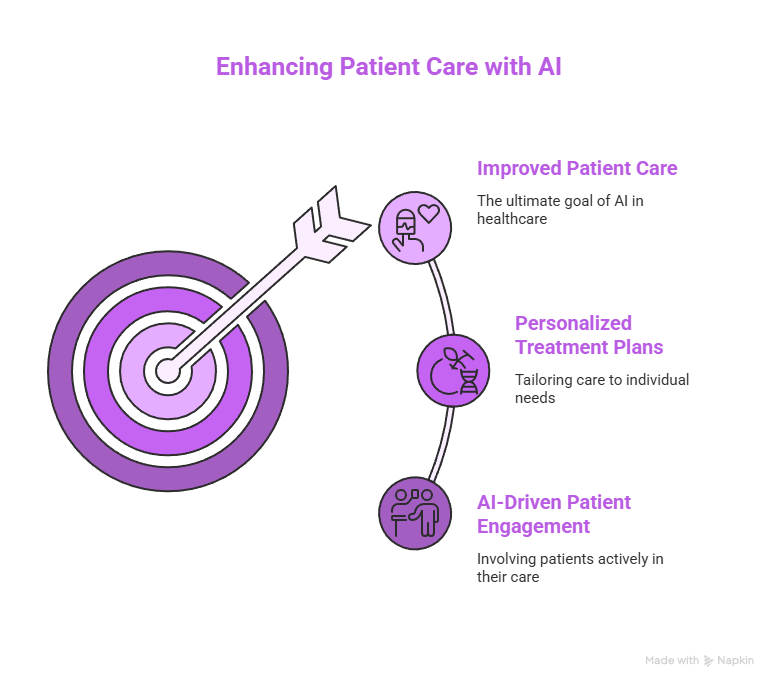
AI is helping doctors treat people, not just symptoms. Since no two patients are alike, AI looks at health records and other data to shape care that fits each person. It helps doctors act faster and choose the best steps for each case. This means better care, right when it’s needed most.
Customized Treatment Plans
AI helps doctors create care plans that match each person’s genes, habits, and choices. In cancer care, it picks treatments that fit the cancer type better. This boosts success and makes patients feel more cared for. AI also keeps learning from new results and updates plans fast, giving the best care every step of the way.
How AI Helps Patients Stay Involved in Their Care
Getting patients involved in their care boosts health results. AI chatbots and helpers give tips, reminders, and mental health help. These tools push patients to stay on track and stick to their plans. AI also spots who might need extra care, so doctors can step in early. This builds trust and helps patients take charge of their health for the long run.
How AI Takes the Stress Out of Healthcare Paperwork
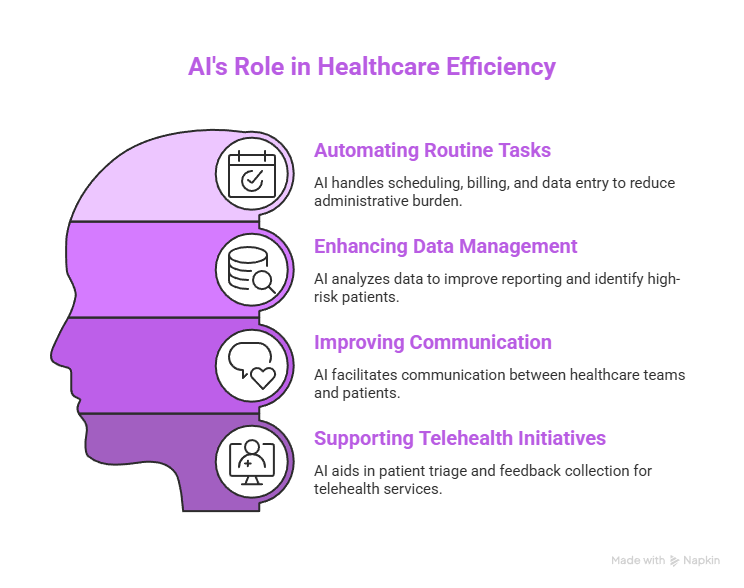
AI is helping healthcare run smoother by easing admin work. Doctors often feel buried in paperwork, leaving less time for patients. Now, smart tools can handle things like scheduling and billing. That means more time for real care and less time behind a desk. It also makes the job less stressful and the system more efficient.
How AI Helps with Everyday Tasks in Healthcare
AI handles tasks like scheduling, billing, and data entry. It finds the best time slots for visits, cutting wait times and boosting satisfaction. With less admin work, doctors can focus more on care. AI also sends reminders, helping patients show up and clinics run smoothly.
Enhancing Data Management
AI boosts how healthcare handles data. It scans large data sets to find trends, speed up reports, and meet rules. This saves time and lifts care quality. AI can spot high-risk patients early and suggest custom care plans. It also keeps EHRs accurate and easy to use, helping doctors make better choices.
Improving Communication
AI improves how healthcare teams and patients talk. Chatbots and assistants answer questions fast about symptoms, meds, or visits. This helps staff save time and patients feel heard. AI also helps doctors share key info quickly and clearly, making teamwork better and care safer.
Supporting Telehealth Initiatives
AI boosts telehealth by sorting patients by need during virtual visits. This helps doctors treat urgent cases first. It also tracks how patients interact and feel, giving useful feedback. Clinics can use this data to improve services and better meet patient needs.
Challenges and Considerations
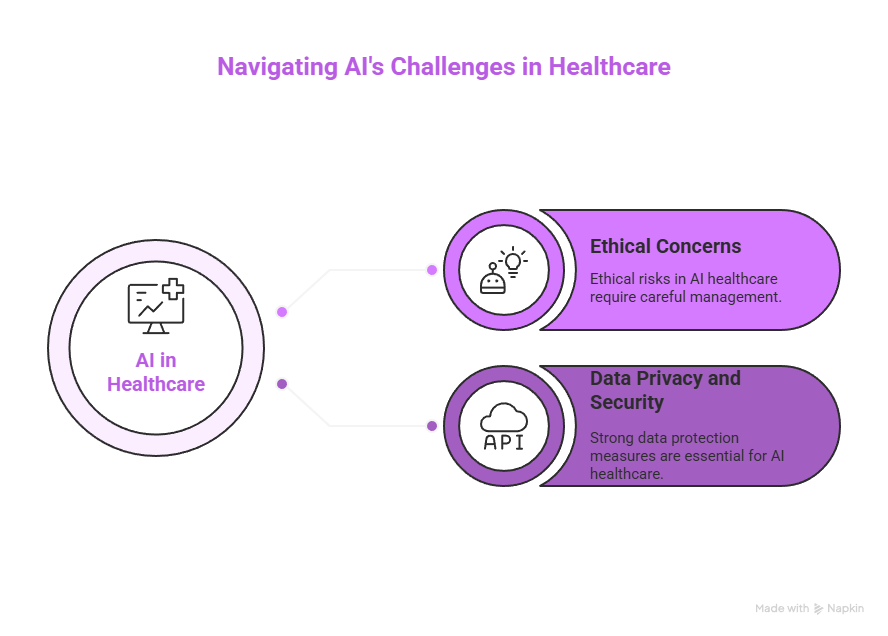
AI brings big benefits to healthcare, but it also creates new problems. Using AI in medicine raises concerns about ethics, data safety, and unfair bias in tools.
Ethical Concerns
As AI grows in healthcare, ethical risks must be handled with care. Informed consent, clear choices, and responsibility are key. Health groups need firm rules to guide fair AI use. AI may also repeat old healthcare biases. If it learns from unfair data, it may keep those gaps. So, AI tools must be checked and fixed often to stay fair and just.
Data Privacy and Security
Patient data is private, so AI use in healthcare needs strong safety steps. Health groups must guard data from hacks or misuse. They should follow rules like HIPAA and use solid security plans. AI also brings up issues about who owns data and who agrees to its use. Many patients don’t know how their data is used or shared. Clear talk about data use is a must. Groups must follow the law and also involve patients in choices about their data and AI’s role in care.
The Future of AI in Healthcare
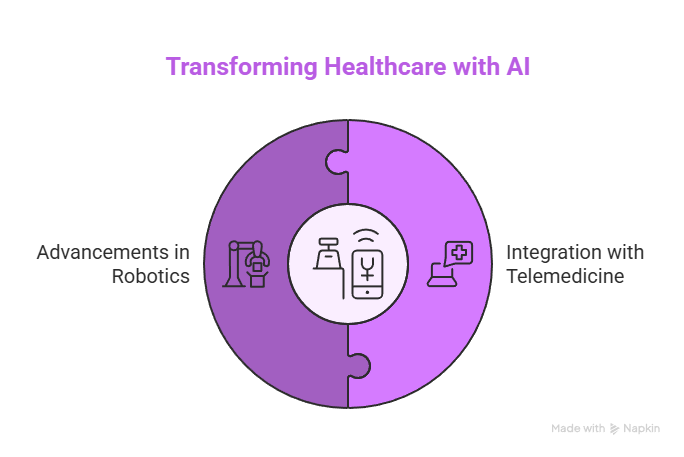
AI’s future in healthcare looks bright as tech and research grow. As AI improves, it will bring more ways to boost care and run systems more smoothly.
Integration with Telemedicine
Telemedicine grew fast after COVID-19. Adding AI makes remote care better with real-time data checks and smart help for doctors. AI can sort patient needs, suggest care, and track health from afar. It can also study data from wearables to spot health risks early. This mix makes care smoother and gives doctors clear, quick facts to act on.
Advancements in Robotics
AI-powered robots are changing healthcare. Surgical robots do complex tasks with great skill and less cutting. They give real-time help to surgeons, boosting results and healing speed. Outside surgery, rehab uses AI robots like exoskeletons to help patients walk again. These tools adjust to each person, offering care that speeds up recovery and life quality. As tech grows, more smart uses will reshape how care is given.
Trending Now
AI is becoming a helpful partner in caring for one another. It gives doctors a head start in spotting health issues, choosing the right care, and checking in from a distance. With fewer staff and rising costs, AI gives much-needed support. But it’s not just about smart tech, it’s about caring for people, keeping their info safe, and building trust every step of the way. The best AI tools are built with real care, tested with real patients, and shaped by real stories. In the future, AI won’t replace doctors it’ll stand beside them, helping give every person better, fairer care.
As we navigate the exciting intersection of AI and healthcare, consider the power of efficiency and expert support in your own organization. HelpSquad Health stands ready to enhance your operations with our virtual assistant and 24/7 customer service team. Specializing in customer support, back-office tasks, and research, our bilingual agents are available starting at just $9 per hour. Embrace the future of healthcare with HelpSquad Health’s commitment to excellence.

